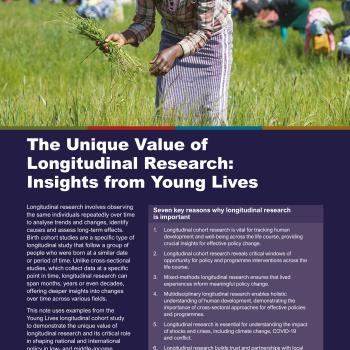
Longitudinal research involves observing the same individuals repeatedly over time to analyse trends and changes, identify causes and assess long-term effects. Birth cohort studies, are a specific type of longitudinal study that follow a group of people who were born at a similar date or period of time. Unlike cross-sectional studies, which collect data at a specific point in time, longitudinal research can span months, years or even decades, offering deeper insights into changes over time across various fields.
This summative report uses examples from the Young Lives longitudinal cohort study to demonstrate the unique value of longitudinal research and its critical role in shaping national and international policy in low- and middle-income countries (LMICs), and in helping to meet global targets such as the Sustainable Development Goals (SDGs).
For more on Young Lives research methods click here.

Longitudinal research involves observing the same individuals repeatedly over time to analyse trends and changes, identify causes and assess long-term effects. Birth cohort studies, are a specific type of longitudinal study that follow a group of people who were born at a similar date or period of time. Unlike cross-sectional studies, which collect data at a specific point in time, longitudinal research can span months, years or even decades, offering deeper insights into changes over time across various fields.
This summative report uses examples from the Young Lives longitudinal cohort study to demonstrate the unique value of longitudinal research and its critical role in shaping national and international policy in low- and middle-income countries (LMICs), and in helping to meet global targets such as the Sustainable Development Goals (SDGs).
For more on Young Lives research methods click here.

